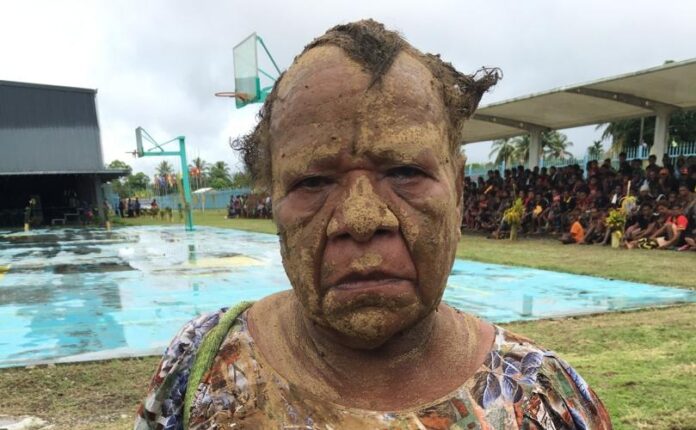By Lynette Kil
COVERING herself in mud, she stumbled through the crowd, her vision blurred from tears, grieving the loss of her loved one.
We were part of the team that covered the funeral service for the late Minister for Education and Member for Usino-Bundi, Jimmy Uguro in Madang. As I made my way to Walium, I bumped into Claire Peter.
Midway through the crowd, I stopped Claire. With teary eyes, she looked at me, her sorrow intense. My own eyes gushed with tears, but I fought to keep them from falling.
Speaking slowly in pidgin, I introduced myself and explained why I had stopped her. She introduced herself as Claire from Nikel Ramy, late Minister Uguro’s cousin sister. Her voice trembled with emotion as she spoke.
I assured her she could take her time. “Em (late Uguro) man karim em na mi Meri karim me. (Late Uguro father and my mother are biological brother and sister). Em kandere blo mi (Late Uguro is my cousin). Ol tok em die tasol mi no bilip. (They said he died, and I did not believe it. But I read it in the papers and I’m sad,” she said, her words heavy with grief.
She explained that her mother and late Uguro’s father were blood relatives, sharing the same parents. Claire struggled to come to terms with the loss, unable to fully believe it until she saw it in the newspaper.
“He built this Walium station, road, and bridge to our village,” she continued, her voice wavering.
“Late Uguro also bought modern roofing.”
“Em wokim ap blo ol mangi lo play bal (He built a football stadium at Waliume station for youths to involve in sports),” she added,
“Mipla tin em bai kam opim game tasol em no kam em i pasim eye (We though he was going to come for the opening of the football stadium , but that moment never came because he passed away),” she lamented.
“Mi cry na kam because ol kisim body blo kandre blo mi kam, olsem na mi sorry na bel em buruk. Mipla no nap painim wanpla man olsem em.
(I came to join in the mourning of my brother. Madang people especially the people of Usino Bundi will never replace this great man).
With tears in her eyes, she mourned the loss of her brother, leader, and minister. She said the pain of his absence was raw and the void he left was impossible to fill.
Meanwhile, the casket of the late Minister was laid to rest in his birthplace at Bill village on March 15.
His burial was attended by Deputy Prime Minister John Rosso, who flew in from Lae along with other members and ministers.
The late Uguro, who passed away on February 6th in East Sepik province while on duty, was a significant loss to the Education Sector, his constituents, family, the government, and the country as a whole.
Prime Minister James Marape, accompanied by cabinet ministers and members of the government Caucus, travelled with the late Uguro’s casket and his immediate family, including the widow and children, to Madang province on March 13. They then journeyed by road to Walium station to hand over the casket to the late minister’s people.
Marape described the late Uguro as a dedicated fighter and advocate for rural people, working tirelessly on their behalf.
“I’ve seen him many times in cabinet, balancing commitments to our nation’s greater good,” Marape said.
“He exemplified the type of leadership in my team – simple, with the country’s interests first, desiring nothing but the best for our people. He was a loyal colleague through thick and thin, simple and down-to-earth, with a visionary focus.”
Marape expressed his sadness at seeing the people of Madang, especially students and children, welcoming the late Uguro’s casket home.
“His death was unexpected for a young leader like him,” Marape continued.
“I wanted to bridge the education gap, and he shared that passion, aspiration, and drive to make education an enabler for our children and people. Our focus was on leaving no child behind, and he was among my best ministers.”
Since assuming office in 2020, the late minister achieved significant milestones, including increasing the number of students enrolling in school to over 1.8 million, an improvement from 1.6 million previously. He also made strides in Flexible Open Distance Learning (FODE), providing 100,000 students with a second chance at education, and eliminating grade ten dropouts by converting high schools to fully pledged secondary schools. The late minister also implemented specialized programs in math and science, sending top-performing students to the USA for further studies.
Marape emphasised the late minister’s most crucial achievement – a 50-year plan for education, aimed at providing not just qualifications, but true education.
“In the past, we focused on qualifications, but not education.”


